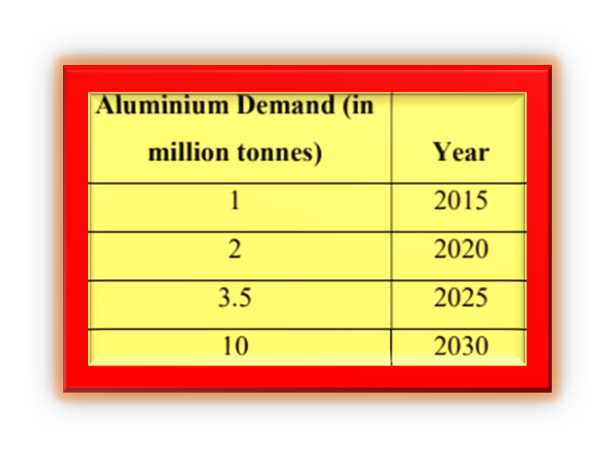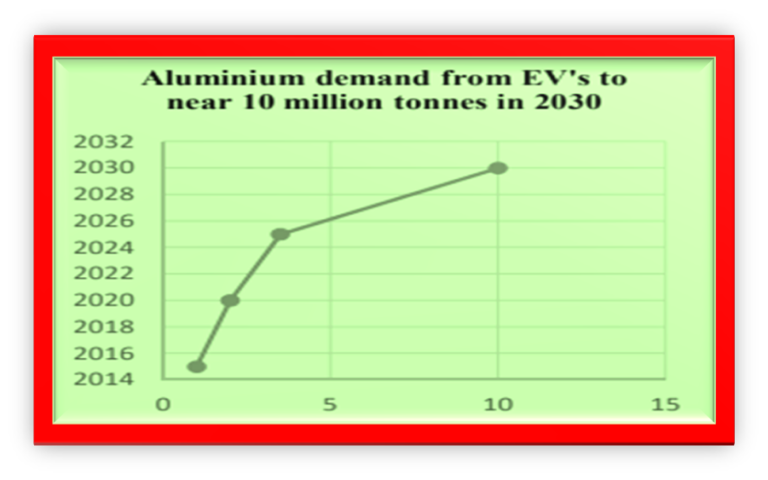Demand for Aluminum Die Casting in Electric Vehicle Revolution
Written By –
The #automotive industry is undergoing a transformative shift towards sustainability, driven by stringent regulations aimed at reducing CO2 emissions and optimizing energy efficiency. This paradigm shift has paved the way for the rapid adoption of innovative lightweight automotive component manufacturing techniques, with aluminum die casting emerging as a key player in the electric vehicle (EV) segment.
Governments and regulatory bodies worldwide have implemented strict emissions standards, propelling automakers to explore methods for reducing vehicle weight and improving fuel economy. The transition from heavy materials like steel to lighter metals, such as aluminum, has become a critical strategy in this pursuit. By incorporating structural die-cast components, manufacturers can significantly reduce vehicle weight, thereby enhancing overall efficiency.

In the realm of electric and hybrid vehicles, aluminum die casting plays a pivotal role in the production of essential drive and powertrain components, including electric motors. The structural integrity and lightweight properties of die-cast aluminum, zinc, and copper make them ideal materials for these applications, contributing to the overall performance and range of EVs.
The electric vehicle sector has witnessed unprecedented growth on a global scale, fueled by a confluence of factors such as stringent pollution regulations, industrial disruptions, and evolving consumer preferences. Heightened environmental consciousness regarding CO2 emissions, coupled with initiatives by government authorities like the European Commission (EC) and programs such as Europe NCAP, has further stimulated the demand for fuel-efficient electric and hybrid vehicles.

As nations worldwide recover from economic challenges, the rise in real incomes is expected to drive consumer preference for fuel-efficient vehicles. This shift in consumer behavior, combined with supportive government policies and incentives, is poised to accelerate the adoption of electric vehicles in the coming years.
The projected growth in EV demand presents a lucrative opportunity for the aluminum die casting industry. Market research indicates that the global aluminum die casting market in the automotive sector is expected to reach USD 79.13 billion by 2028, growing at a CAGR of 10.2% during the forecast period (2021-2028). This growth is largely attributed to the increasing demand for lightweight components in EVs.
Investors and industry stakeholders are taking note of the immense potential in the aluminum die casting market within the EV segment. Companies that can effectively cater to the rising demand for high-quality, lightweight, and precision-engineered die-cast components are well-positioned to capitalize on this burgeoning market.
As the automotive industry shifts towards electric vehicles (EVs), some die casting employees and employers may worry about the future of their jobs. With no internal combustion engines in EVs, it might seem like there will be less need for die cast components. However, this is not the case.
While EVs don’t have traditional engines, they still require numerous lightweight parts to optimize battery efficiency and overall performance. This presents a significant opportunity for the die casting industry to adapt and thrive in the new era of automotive manufacturing.
To capitalize on this opportunity, die casting professionals must embrace a challenging attitude and focus on identifying and producing innovative lightweight components for EVs. This includes parts for electric motors, battery housings, structural components, and more.
By developing expertise in lightweight aluminum, magnesium, and zinc die casting, companies can position themselves as valuable partners to EV manufacturers. The demand for these lightweight components will only grow as automakers strive to improve the range and efficiency of their electric vehicles.
In conclusion, the shift to EVs does not spell the end of die casting jobs. Instead, it presents a challenge and an opportunity for the industry to evolve and play a crucial role in the future of automotive manufacturing. By adopting a proactive and innovative mindset, die casting employees and employers can secure their place in the EV revolution.
In conclusion, the rapid expansion of the electric vehicle sector, driven by environmental concerns, government regulations, and changing consumer preferences, has catalyzed the demand for aluminum die casting. As the world transitions towards a more sustainable future, the aluminum die casting industry is set to play a crucial role in shaping the next generation of lightweight, efficient, and eco-friendly vehicles. This presents a compelling investment opportunity for those seeking to align with the global shift towards cleaner transportation solutions.


Follow us on social media to stay updated with our latest blogs!
Youtube
Transform Your Diecasting Today!
Partner with SDS to unlock unparalleled efficiency and quality in your diecasting operations.
